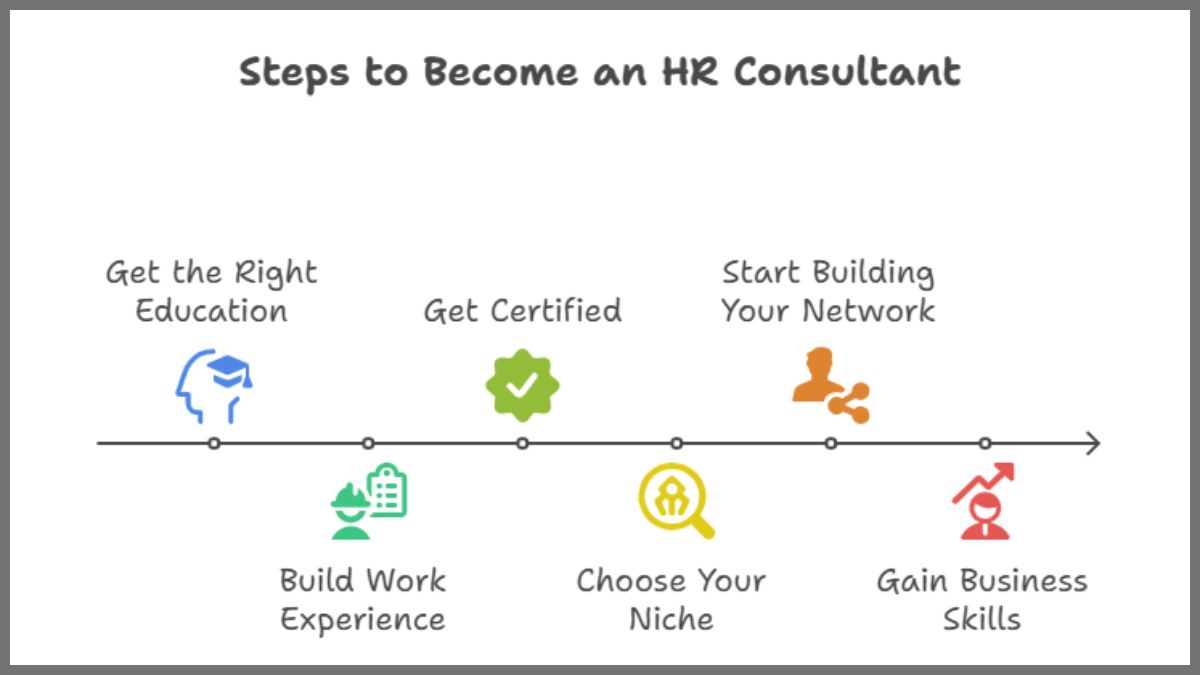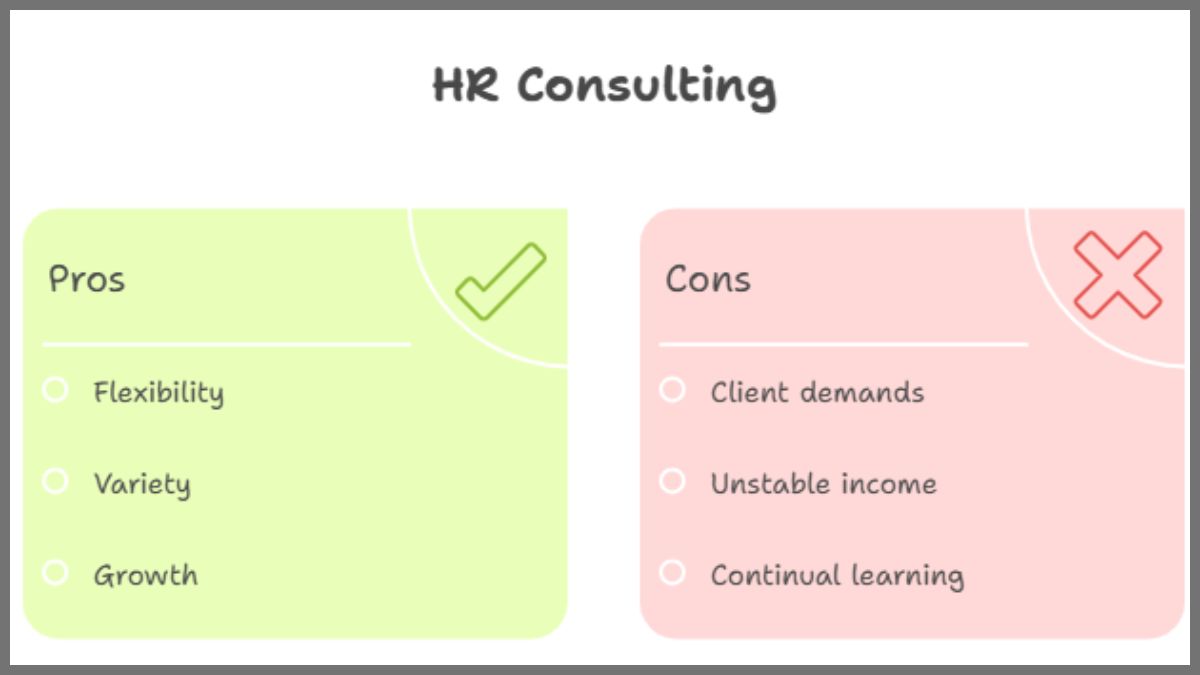Have you ever wondered how companies make their workplaces more efficient, supportive, and legally compliant? The answer often lies in HR consulting. If you enjoy helping people, solving problems, and working with businesses, a career in HR consulting might just be your perfect fit!
In this blog post, we’ll explore what HR consulting is, what these professionals actually do, and how you can start your journey into this rewarding career.
What Exactly Is HR Consulting?
Let’s break it down. HR stands for Human Resources. In simple terms, HR consultants are experts who advise companies on how to manage their employees better. They help businesses improve how they hire, train, deal with employee issues, and follow labor laws.
Think of an HR consultant as a personal coach for a company’s people strategy. Instead of managing a team directly, they support the company to build better workplaces, reduce problems, and grow effectively.
What Do HR Consultants Actually Do?
HR consultants can work on a wide range of projects. Their responsibilities might vary depending on the company’s size and needs. Generally, their tasks include:
- Recruitment and Staffing: Helping businesses find the right people for the right jobs.
- Training and Development: Creating programs to help employees grow their skills.
- Performance Management: Setting up systems to evaluate and improve employee performance.
- Policy Creation: Designing workplace policies that are fair and compliant with labor laws.
- Employee Relations: Resolving conflicts and improving communication between staff and management.
- Compliance: Making sure the company follows labor laws and HR regulations.
In short, HR consultants work behind the scenes to make workplaces more productive and positive — without micromanaging anyone’s daily tasks.
Types of HR Consulting Services
Not all HR consultants do the same thing. Many specialize in certain areas. Here are some common types:
- Strategic HR Consultants: Focused on long-term planning and aligning people strategies with business goals.
- Operational HR Consultants: Help with daily HR functions like employee onboarding, benefits, and payroll systems.
- Legal HR Consultants: Offer guidance on handling workplace laws, employee contracts, and regulatory compliance.
- Technology-based Consultants: Advise on choosing and implementing HR software like HRIS (Human Resource Information Systems). If you’re curious about tools available in India, here’s a helpful list of HR software options to explore.
Depending on your interests, you can choose a specialization that suits your strengths.
Who Hires HR Consultants?
Here’s the good news — HR consultants are in demand across industries. Some large corporations may have in-house HR teams but still hire consultants for expert advice or to work on special projects. Others, especially small to medium-sized businesses, may completely rely on HR consultants to manage their human resource functions.
Consultants can work independently, as freelancers, or with HR consulting firms that serve multiple clients. You’ll often find roles in industries such as:
- Information technology
- Healthcare and pharmaceuticals
- Retail and ecommerce
- Finance and insurance
- Manufacturing and logistics
How to Start a Career in HR Consulting
Now that you know what they do, let’s talk about how you can become an HR consultant. There are many exciting career options within the HR field, and consulting is just one of them. Here’s a step-by-step guide:
1. Get the Right Education
Most HR consultants start with a bachelor’s degree in human resources, business management, or a related field. Some may also pursue a master’s degree in human resource management, especially if aiming for higher-level positions or specialized roles.
Don’t have a degree in HR? That’s okay. You can still switch to this career by gaining relevant experience and certifications.
2. Build Work Experience
Before becoming a consultant, many professionals work in traditional HR roles like recruiter, HR officer, or training specialist. This experience not only builds your knowledge but also helps you understand real workplace challenges. If you’re preparing for HR job interviews, these common HR interview questions and answers can help you feel more confident.
Let’s say you’ve worked in your company’s training department for a few years. That background could form the perfect base if you want to specialize in employee development as a consultant.
3. Get Certified
Certifications are not always mandatory, but they do boost your credibility. Some well-known certification programs include:
- SHRM-CP or SHRM-SCP (Society for Human Resource Management)
- PHR or SPHR (Professional in Human Resources)
- Talent Management Institute Certifications
These credentials help signal your expertise to potential employers or clients.
4. Choose Your Niche
As we mentioned earlier, HR consulting isn’t one-size-fits-all. Are you more interested in technology or workplace culture? Do laws and compliance fascinate you? Choose a specialty that fits your passion and skill set.
5. Start Building Your Network
Consulting is a relationship-based business. Attend HR conferences, join LinkedIn groups, and connect with professionals in the field. The more you network, the easier it becomes to land your first few clients or job roles.
6. Gain Business Skills
HR knowledge is great, but many consultants are freelancers or run their own businesses. That means understanding how to market your services, write proposals, price your work, and manage time effectively.
Pros and Cons of HR Consulting
Advantages:
- Flexibility: Many consultants work on their own schedules, especially if freelancing.
- Variety: You get to tackle different types of projects across various industries.
- Growth: High demand means plenty of potential opportunities and generous pay scales.
Challenges:
- Client demands: You’ll have to juggle multiple clients or deal with tight deadlines.
- Unstable income: Freelancers especially may face an unpredictable flow of work.
- Continual learning: Labor laws and HR practices change, and you’ll need to keep up.
Summing It Up
HR consulting is a dynamic and fulfilling career where you can make a real difference in how companies function and how employees thrive. Whether you’re still studying, working in HR, or thinking of a career change, this field offers opportunities for growth, flexibility, and impact.
And the best part? You don’t need to follow just one path. With the right mix of skills, experience, and a passion for people, you can craft a career that’s as unique as you are.
So, if you’re ready to help others build better workplaces — while building a rewarding career for yourself — HR consulting could be exactly what you’ve been looking for.
Thinking of starting your journey in HR consulting? Begin with learning more about your interests, gain relevant experience, and don’t be afraid to take the first step.






